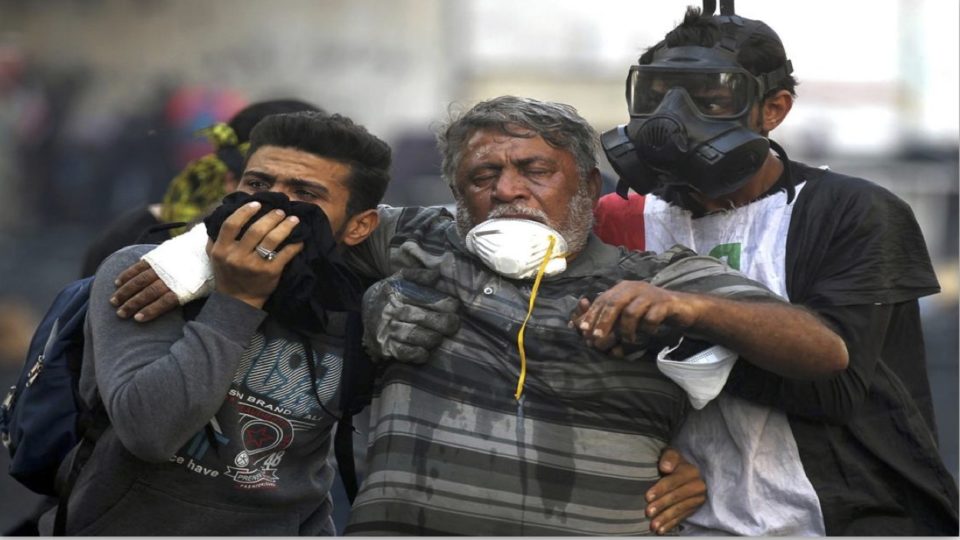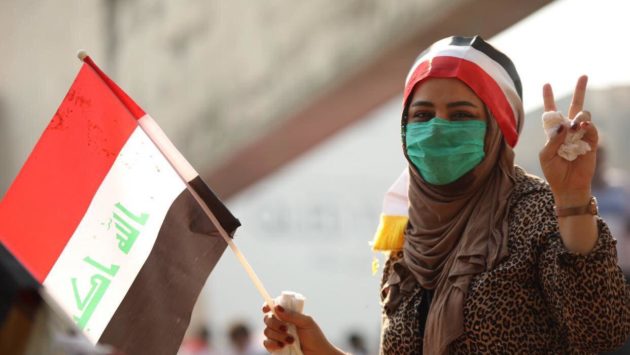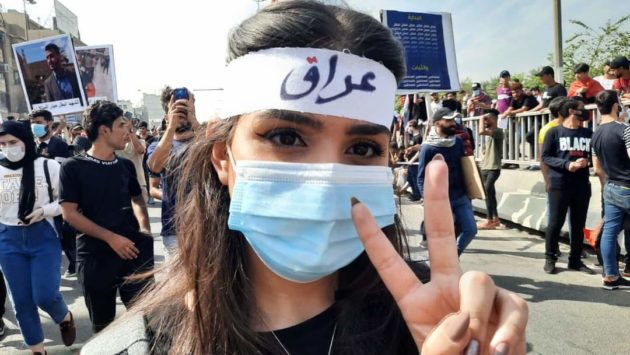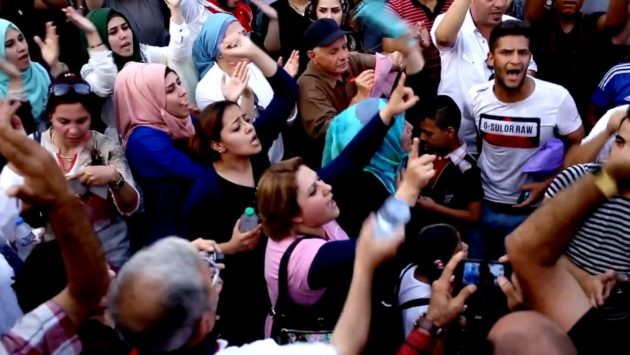The Rain of Smoke
The Status of Human Rights in the Iraqi Demonstrations, 25 October – 1 December Peace and Freedom Organization, Sergio di Mello Team
— Report Summary —
Introduction
The Sergio di Mello Team (SDMT) of the Peace and Freedom Organization is a group of men and women human rights defenders working throughout the entire the Republic of Iraq. Their mission is to observe and monitor human rights and fundamental freedoms in the field. The team has just produced a report documenting some of the major human rights violations which occurred in Iraq from 25 October – 1 December. This is the team’s second report; the first, entitled “The Violence of Repression”, covers the demonstrations from 1 October – 9 October. The new report also includes recommendations for the Iraqi government and international institutions and organizations.
On 25 October, peaceful demonstrators took to the streets throughout the country to protest government corruption, high unemployment, a rise in poverty and lack of basic services. The peaceful demonstrations sparked an extremely violent response by security forces and riot police under the command of former Prime Minister Adil Abdul Mahdi, along with other armed militias and snipers.
SDMT’s journalists reported on these protests in the governorates of Dhi Qar, Basra, Najaf, Maysan, Diwaniyah, Karbala, Wasit, Babel, and at least one observer covered the governorates of Diyala, Anbar, Kirkuk, Muthanna and Nineveh.
Human rights violations
Some of the worst violations carried out by security forces, riot police, militias and snipers include:
- murder
- kidnappings and forced disappearances
- arbitrary arrests
- burning of tents and temporary shelters
- excessive use of tear gas leading to suffocation, temporary blindness, skin irritation
- tear gas cartridges launched horizontally into crowds transforming them into deadly weapons
- smoke and sound bombs thrown recklessly into crowds of peaceful demonstrators
- pepper spray
- rubber bullets
- live ammunition directed at unarmed protestors
- beatings with club and sticks
- indiscriminate use of military level firearms (AK47s, BKC machine guns, attack rifles)
- hand grenades
- egregious government neglect of its responsibility to protect its citizens
- internet shutdown and curfews
- road blockades and check points which severely limited access to public spaces
- aggressions against journalists
- Iraqi Communications and Media Commission were compelled by government authorities to close 9 offices of Iraqi channels, ‘to preserve the public order’
Demonstrators’ response
In response to this extreme and unlawful violence, demonstrators remained largely peaceful, though there are confirmed reports of:
- burning party and government offices
- throwing stones and Molotov cocktails
- targeting law enforcement officials with glass balls
- using temporarily blinding laser lights
Strength of Iraqi people and civil society
While the violent response to the peaceful protesters has negatively impacted the daily life of Iraqis (restricting free movement, closure of some schools, and generally contributing to a climate of fear and uncertainty), SMDT’s report suggests that the positive effect of the demonstrations has been substantial, reflecting the strength, resilience and unity of the Iraqi people and civil society. For instance:
- government hospitals, municipal cleaning services, and the availability of water and electricity have not been affected
- a rise in the sense of citizenship and a great convergence among social groups
- ostracism of hate speech on social media sites, a firm rejection of stereotyping, and a gathering around those voices calling for civil peace
- creation of public murals, hundreds of voluntary campaigns organized to clean and repair streets
- active and increased support of local producers and their products
- demonstration of youth power and leadership
- recognition of the role of women in society; massive decline in sexual harassment
- effective solidarity campaigns supporting the wounded and injured and compensating demonstrators whose private property was destroyed or burned in the demonstrations
SMDT recommendations: Iraqi government
- join the Treaty of Rome in 1998 to guarantee international non-impunity for anyone who commits grave human rights violations, considered crimes against humanity
- hold all those responsible for human rights violations legally accountable, especially commanders, and those who carried out the deliberate killing of demonstrators
- hold accountable all individuals who took advantage of the right to demonstrate to commit crimes such burning official and semi-official buildings
- refrain from pursuing demonstrators who participated civil disobedience, like blocking strategic streets or roads
- cancel the 2003 Demonstration and Assembly Law, which was approved by the Coalition Provisional Authority
- approve the draft law on the freedom to demonstrate and assemble peacefully
- pledge not to prosecute peaceful demonstrators and cancel any promises they made not to participate in future demonstrations
- Refrain from prosecuting human rights and fundamental freedoms monitors working in the field, journalists and media workers who have carried out their moral duties and in accordance with the applicable local law.
SMDT recommendations: United Nations and the International Committee of the Red Cross
- provide full technical support to all Iraqi law enforcement agencies so that they are trained to respect human rights and fundamental freedoms in cooperation with the Government of the Republic of Iraq,
- direct the special rapporteurs and task forces on the need for comprehensive briefing and request the Iraqi Government to organize visits to them as soon as possible.
- train high-level human rights monitors and fundamental freedoms in the field in order to carry out their duties and responsibilities,
- protect human rights and fundamental freedoms monitors in the field with the International Protection Movement’s badge, thus providing them with maximum protection.
To read the full report click here




